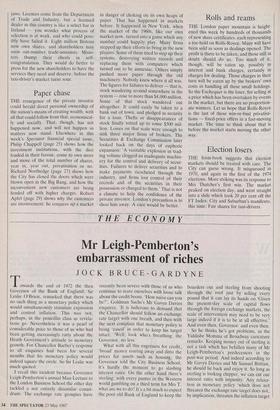CITY AND SUBURBAN
How to be taken for a ride in a taxi-driver's market
CHRISTOPHER FILDES
We are in a taxi-driver's market. Shares have gone soaring upwards, like untethered balloons, with the market- makers desperately trying to catch hold of the string. Everybody else has a happy story to tell, of how this share has doubled in months, or that piece of stagging has paid for the school fees — and, by way of sequel, a new share to tip. Old hands, at such times remind themselves of an old maxim: when a taxi-driver tips you a share, it is time to sell it. No reflection on his judgment, but too many people will have passed on the story, and acted on it, before it can reach him. I thought of that maxim as the taxi-driver in whose care I was rolling eastward to the City told me how he was pleased with his British Gas (they would go higher, he said) and was looking forward to his Rolls-Royce. Rightly, though, he believed that there should be more to being a shareholder than applying for each privatisation as it came along and putting the certificate in a tin box. He had asked the Stock Exchange to suggest a stockbroker who could help him. The Exchange keeps a list of firms willing to
have their names put forward, and, as is its practice, sent him three. He wrote to them all. The first firm turned him down sight unseen, explaining that it had at the moment, more private-client business than it could manage. The second replied that it would be pleased to handle his invest- ments, if they were more than £75,000. The third, coming closer to earth, would
take orders, provided that they were in amounts of £1,000 or more, and were reasonably frequent. That may well be the smallest order that covers the firm's costs, but it is not much use to anyone left with a tiny allocation from Rolls-Royce. What is blatantly absent from all three firms' re- sponses is any sense that the market for their services has changed, that the number of customers has suddenly quadrupled, that their business might be worth having or that systems might be changed to make it so, that the millions of people now peering through the shop windows might reasonably expect an open door and a mat saying WELCOME. It could be cynically argued that the brokers' indifference was saving the taxi-driver from his enthusiasm's consequences. In fact it was pushing him into greater danger. If the. Stock Exchange was out of reach (he said) he could always deal in the stocks, mostly unlisted or traded 'over the counter', where markets were made by the licensed dealers in securities. They at least wanted his busi- ness. Indeed they do — some of them would welcome him in with gently smiling
jaws. Licences come from the Department of Trade and Industry, but a licensed dealer in this country is like a select bar in Ireland — you wonder what process of selection is at work, and who could poss- ibly have failed it. Eight million Britons now own shares, and shareholders may soon out-number trade-unionists. Minis- ters thump their chests in self- congratulation. They would do better to press for the new shareholders to have the services they need and deserve, before the taxi-driver's market turns sour.










































































 Previous page
Previous page